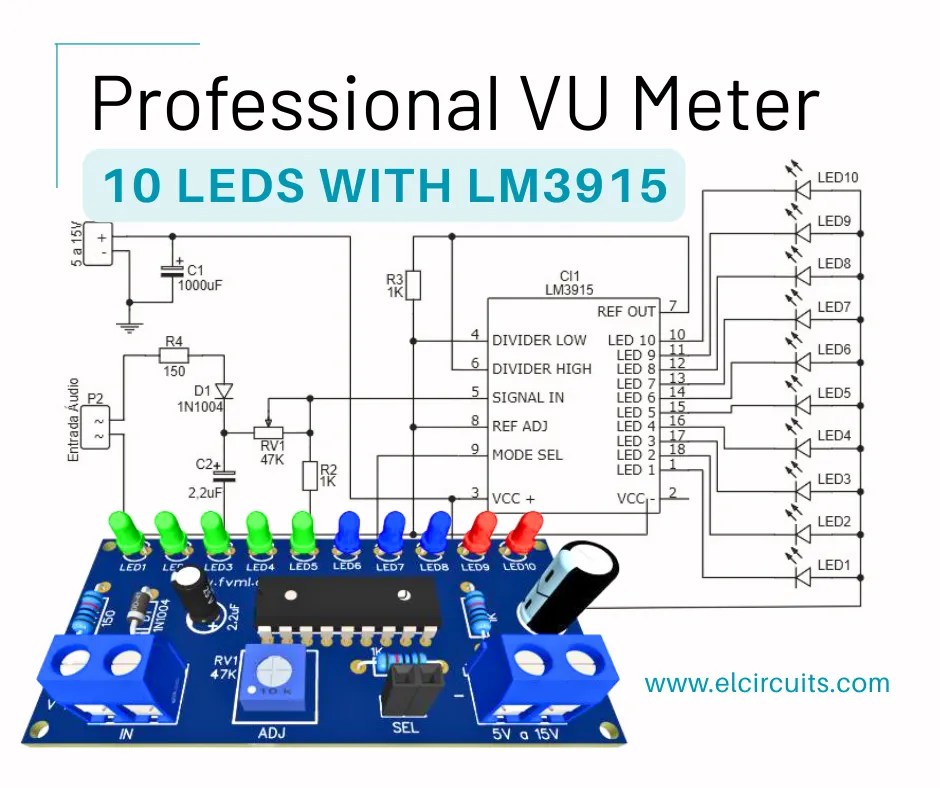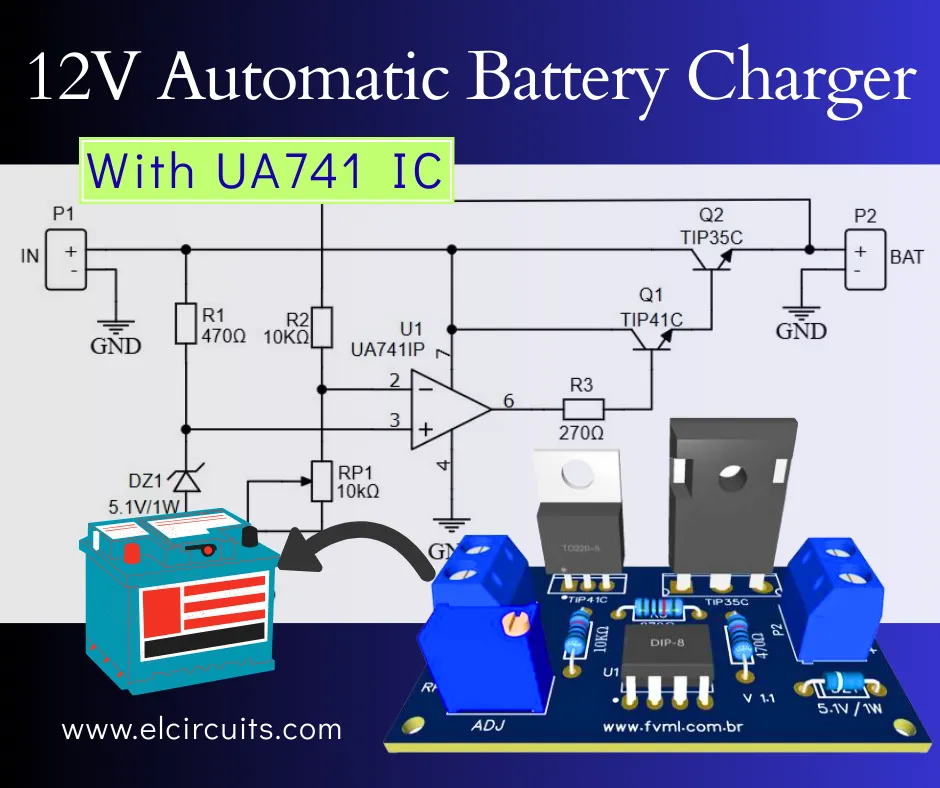Adjustable Power Supply 1.2V–37V 20A using LM317 and TIP35C + PCB
Transform the classic LM317 into a powerful 20A regulator for your most demanding projects
💡 Quick Tip: This project combines the reliability of the classic LM317 with the power of TIP35C transistors, creating an adjustable power supply capable of delivering up to 20A of continuous current – perfect for powering high-power projects like audio amplifiers, battery charging supplies or electric motor testing.
Imagine having on your bench an adjustable power supply capable of providing from 1.25V to 37V with an impressive current of 20 Amps! This is the project we present today, which elevates the capabilities of the already established LM317 to a new level through a clever design with TIP35C power transistors.
The LM317 is one of the most popular and reliable voltage regulators in the world of electronics, but its natural limitation of 1.5A often prevents its use in more demanding projects. The solution? A current “boost” circuit that maintains all the precision and stability of the LM317 while multiplying its power supply capability.
🤔 How Does This Magic Circuit Work?
The genius of this project lies in the elegant division of tasks between the main components, allowing to overcome the individual limitations of each one to create something much more powerful:
🎯 The LM317 – The Brain: It is
the master of voltage. Its only function here is to monitor and precisely
adjust the output voltage, ensuring it remains stable and exactly where
you set it, between 1.25V and 37V.
⚡ The TIP35C – The Muscles: They
are responsible for the heavy lifting. While the LM317 commands, the
TIP35C transistors are the ones that deliver the massive current needed to
reach the impressive 20A.
🔌 Schematic Diagram
The LM317 controls the base of the TIP35C transistors, “telling” them what voltage they should deliver at the emitter. The main current, however, flows directly from the input through the collectors of the TIP35C to the output, bypassing the low current path of the LM317. It’s as if the LM317 were the conductor of an orchestra, without playing any heavy instrument, but ensuring that all the others (the TIP35C) play in perfect harmony.
⚠️ Critical Safety Point: Circuit Protection
Attention: Contrary to what one might imagine, this circuit does NOT have intrinsic protection against short-circuit or current overload at the output.
Although the LM317 has internal protections, they act only on its own output pin, which is low current (up to ~2.2A). In a current “boost” configuration like this, the main current flows through the TIP35C transistors. If a short-circuit occurs at the output, a very high and destructive current will flow directly through the TIP35C, burning them almost instantaneously, before any LM317 protection can act effectively.
The only and exclusive protection against catastrophic failures is the input fuse (F1). It is designed to interrupt the circuit if the total current exceeds its limit (20A), protecting the components and, more importantly, preventing greater risks.
Conclusion: Use this power supply with extreme care. Always check your connections before turning on and never test it on loads whose resistance is unknown or very low. The responsibility for safe operation is entirely on the user.
Despite this characteristic, the circuit is extremely effective for controlled applications, where the user knows exactly what they are connecting. It is a powerful tool for the bench of a hobbyist or professional who understands its risks and benefits.
ℹ️ Detailed Component Analysis
💚 The Heart of the Circuit: LM317
The LM317 is an adjustable positive voltage regulator that stands out for its simplicity and reliability. Originally designed to supply up to 1.5A, in this project it acts as the “brain” of the circuit, precisely controlling the output voltage while delegating the task of supplying high current to the TIP35C transistors.
📚 Did you know? The LM317 has internal thermal protection and current limiting, which means it will try to protect itself in case of overload. This feature is preserved in our design, adding an extra layer of safety to your project.
💪 The Muscles: TIP35C Transistors
The TIP35C transistors are the true heroes of this project, capable of handling high currents that the LM317 alone could not. Each TIP35C can support up to 25A of continuous current and 125W of power dissipation, making them ideal for high-power applications.
However, it is crucial to understand that the maximum current capability depends directly on the output voltage, as explained by Ohm’s Law:
🔬 Applying Ohm’s Law:
P = V × I (Power = Voltage × Current)
For the TIP35C (125W maximum power):
• At 5V: I = 125W ÷ 5V = 25A (theoretical maximum)
• At 37V: I = 125W ÷ 37V = 3.38A (practical maximum)
That’s why we use multiple transistors in parallel – to divide the current load between them and allow safe operation across the entire voltage range. For continuous use at maximum power, we recommend adding more pairs of transistors to the circuit.
🔛 TIP35 Variants
There are different versions of the TIP35 transistor, classified mainly by the maximum voltage they support (Vce):
- TIP35: 40V maximum voltage
- TIP35A: 60V maximum voltage
- TIP35B: 80V maximum voltage
- TIP35C: 100V maximum voltage (recommended for this project)
For this project, we recommend using the TIP35C for its greater safety margin and efficiency, especially if you plan to operate near the 37V output.
🔧 Assembly Tip:
To ensure efficient thermal dissipation, it is essential to use adequate heat sinks for each TIP35C. Consider using quality thermal paste and, for high-power applications, forced ventilation (fans) to keep the transistors at safe temperatures.
📋 Component List
| Component | Specification |
|---|---|
| U1 | LM317 – Integrated voltage regulator |
| Q1 to Q6 | TIP35C – Power transistor |
| D1, D2, D3, D4 | 1N4007 – Silicon rectifier diodes |
| C1 | 4700µF – 63V – Electrolytic capacitor |
| C2, C3 | 0.1µF – Ceramic/polyester capacitor |
| R1 | 220 ohms 1/4W – Resistor (red, red, brown, gold) |
| R2 | 10K ohms 1/4W – Resistor (brown, black, orange, gold) |
| R3 to R8 | 0.22 ohms 5W – Resistor (red, red, silver, gold) |
| P1 | 5k ohms – Potentiometer |
| J1, J2 | PCB terminal blocks – EK500V-XXP 20A or equivalent |
| F1 | PCB fuse holder 250V 30A with 20A Fuse |
| Others | Wires, solders, posts, PCB, etc. |
💡 Important Note:
The 0.22 ohm resistors (R3 to R8) are crucial for current balancing between the transistors. Make sure to use adequate power resistors (5W) to avoid overheating and ensure safe operation of the circuit.
🖨️ Printed Circuit Board – Download
We have developed an optimized printed circuit board (PCB) to facilitate the assembly of this project. The files are available in GERBER, PDF and PNG formats, allowing you to fabricate the board at home or send it to a specialized service.
📥 Files to Download, Direct Link:
Click on the direct link to download the files: PCB Layout, PDF, GERBER, JPG
Step-by-Step Assembly
To ensure the success of your project, follow these recommendations during assembly:
- Start with the smaller components: Soldering the resistors, diodes and smaller capacitors first facilitates the work and reduces the risk of damaging more sensitive components.
- Pay attention to polarity: Check carefully the polarity of the diodes, electrolytic capacitors and the LM317 before soldering.
- Thermal isolation: Use mica insulators and plastic washers when mounting the TIP35C transistors on the heat sinks to avoid short circuits.
- Power connections: Use wires of appropriate gauge (we recommend 10AWG or higher) for the high current input and output connections.
- Test before using: Before connecting loads, check the output voltages at different positions of the potentiometer without load connected.
⚠️ Safety Warning:
This circuit works with high voltages and currents that can be dangerous. Always use personal protective equipment and take special care during testing. If you don’t have experience with high-power circuits, seek the help of a qualified professional.
Practical Applications
This versatile power supply can be used in various applications, including:
🔊 Audio
Powering power amplifiers, pre-amplifiers and automotive audio systems.
🔋 Charging
Charging lead-acid, Li-ion or NiMH batteries with adjustable voltage control.
⚡ Testing
Test bench for DC motors, high-power LEDs and other components.
🔧 Education
Educational tool to demonstrate electronics principles in schools and laboratories.
🤔 Frequently Asked Questions (FAQ)
To ensure your project is a success, we have compiled some of the most common questions about this circuit. Check it out!
❓ Can I use this circuit with a lower power transformer?🔽
Yes, but the maximum output current will be limited by the transformer’s capacity. To take full advantage of the 20A, we recommend a transformer of at least 30A with a secondary voltage of 24V to 30V.
❓ Is it necessary to add short-circuit protection?🔽
The LM317 has internal short-circuit protection, but it limits the current to approximately 2.2A. For complete protection at high current, we recommend adding an external protection circuit or a safety fuse at the output.
❓ Can I replace the TIP35C with other transistors?🔽
Yes, you can use equivalent transistors such as 2N3055, TIP3055 or MJ2955, as long as you adjust the balancing resistors (R3-R8) according to the characteristics of the chosen transistor.
❓ How to add a voltage and current display?🔽
You can add digital voltmeter and ammeter connected directly to the output. There are ready-made display modules that can be easily integrated into the circuit for real-time monitoring.
🔗 Related Content
- Switched Power Supply SMPS 13.8V 10A using IC IR2153 and IRF840, with PCB
- Adjustable Power Supply 1.5V to 28V, 7.5 Amps With IC LT1083 + PCB
- Adjustable Power Supply 1.2V to 37V, 6A, Short-Circuit Protection with LM317 and TIP36 + PCB
- Adjustable Switching Power Supply 5.1 to 40V, 2.5 Amp using L4960 + PCB
- Symmetrical Adjustable Power Supply 1.25V to 47V 10 Amps with Short-Circuit Protection + PCB
✨ Our Gratitude and Next Steps
We sincerely hope this guide has been useful and enriching for your projects! Thank you for dedicating your time to this content.
Your Feedback is Invaluable:
Have any questions, suggestions, or corrections? Feel free to share them in the comments below! Your contribution helps us refine this content for the entire ElCircuits community.
If you found this guide helpful, spread the knowledge!
🔗 Share This GuideBest regards,
The ElCircuits Team ⚡
 Português
Português Español
Español





